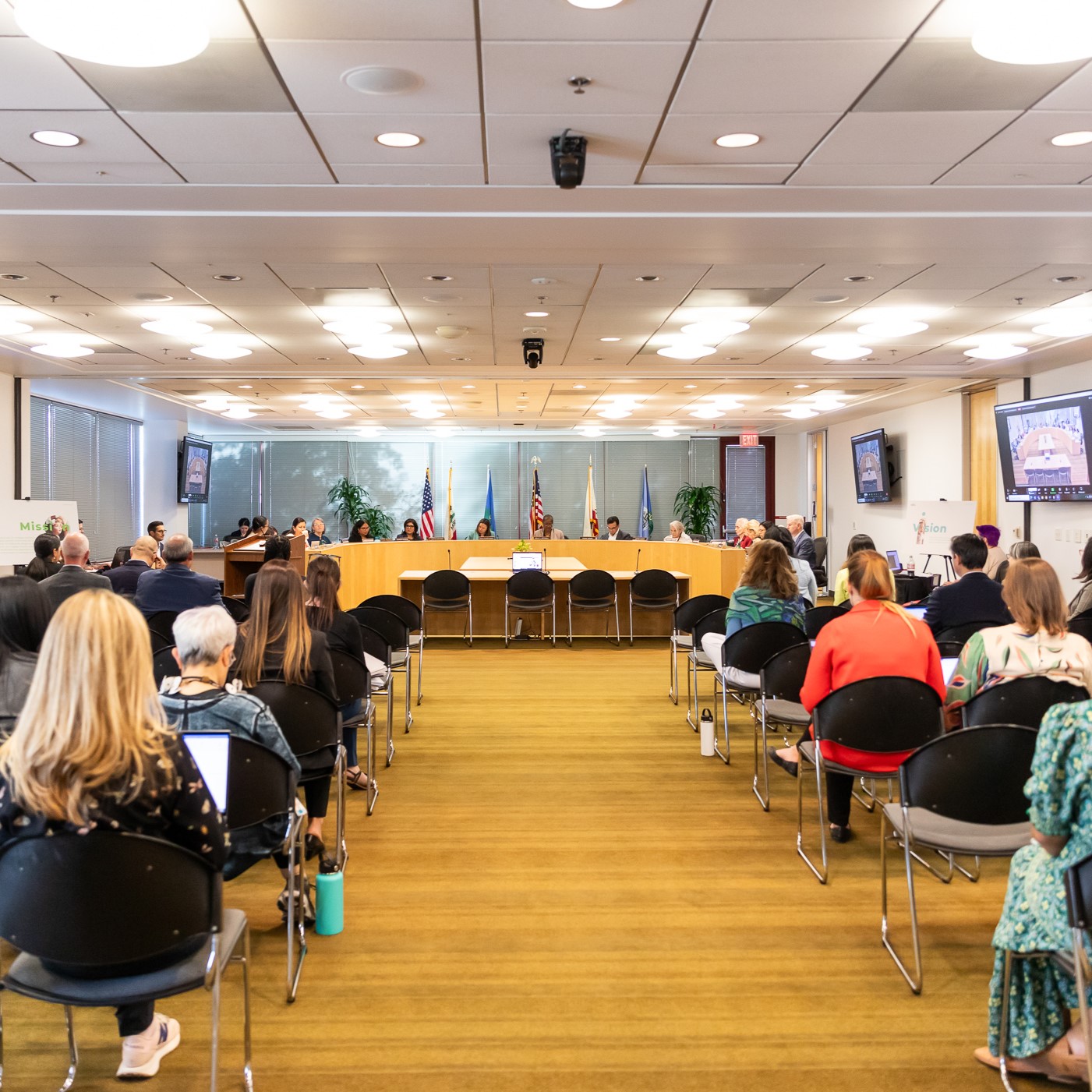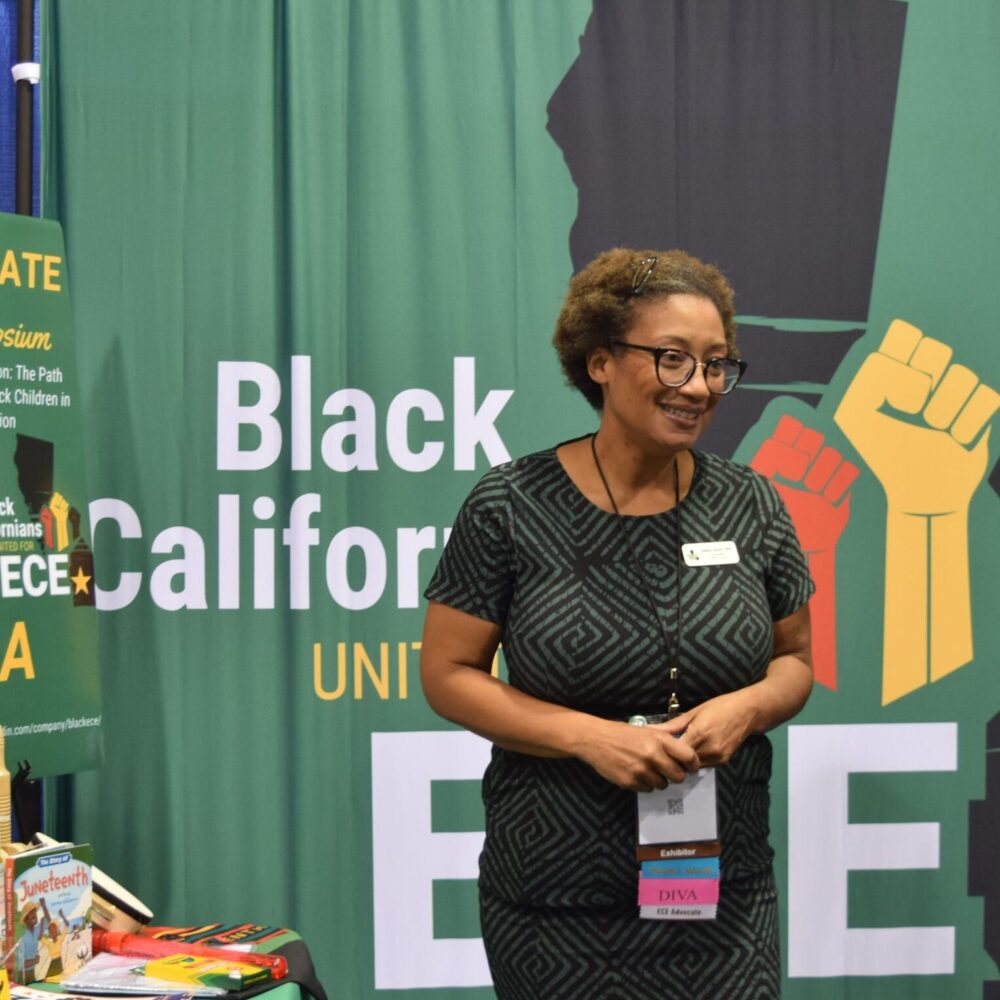When Joshua was 2 years old, his high energy and aptitude for learning prompted his stay-at-home mother Marlene Cole to seek out a high quality day care facility in the Westside of Los Angeles that could further his developmental growth and connect him with other young children outside of their apartment building.
She was in for a rude awakening.
“I went to at least five home-based, licensed early care and education providers,” recalled Cole, who checked out recommendations from neighbors and used a referral service. “At one, the children were just playing with tablets. Another had very few books for all of the children. And one had the older kids playing outside on tricycles and bikes, but all the infants and toddlers were strapped into high chairs.”
The bottom line: “I wasn’t happy with any of them,” Cole said. “They did not have what I was looking for in quality.”
“I wasn’t happy with any of them. They did not have what I was looking for in quality” -Marlene Cole
With Cole planning to return to the work force, she and her husband knew that they had to find a solution. So they tightened their purse strings and chose to enroll their son in a high quality early care and education environment. While some early learning sites would have cost them about $500 a month for part-time care five days a week, they shelled out nearly twice as much – $900 a month – for a high quality setting that offered them peace of mind and the educational and social stimulation their son required.
When she thinks about it, Cole knows how lucky she was. “I tear up a little thinking how a lot of people can’t afford what we did for Joshua,” said Cole, who now works as a program officer at First 5 LA.
Expanding access to high quality early care and education (ECE) is one of the top priorities under First 5 LA’s 2015-2020 Strategic Plan as part of its mission to ensure that all children in Los Angeles County enter kindergarten ready to succeed in school and life. Under this Strategic Plan, the targeted ECE outcomes are aimed at systems and policy change at the local, state and federal levels. These include the strengthening and expansion of a countywide Quality Rating and Improvement System (QRIS); establishment of a countywide Kindergarten Readiness Assessment (KRA); development of a sustainable ECE Workforce Registry; establishment of a California early childhood teaching credential; strengthening of the early educator professional development system; and policy and advocacy work to prioritize access to high quality ECE at the local, state, and national levels.
“I’m excited about the work that we are doing because we have the potential to improve outcomes for generations of young children through our policy and systems change approach,” said First 5 LA Director of Early Care and Education Katie Fallin. “We have ambitious goals, but by partnering with many other organizations – both public and private – I believe that we can have a profound impact on improving young children’s access to high quality early care and education and ultimately ensure that all children enter kindergarten ready to succeed.”
A Waiting List of 300,000
 While numerous studies over the years have provided evidence that high quality ECE positively benefits young children, the outcry of public support for access to high quality – and affordable – ECE has recently grown more evident across the nation and in California:
While numerous studies over the years have provided evidence that high quality ECE positively benefits young children, the outcry of public support for access to high quality – and affordable – ECE has recently grown more evident across the nation and in California:
- The overwhelming majority of Californians say attending preschool is very important (68 percent) or somewhat important (21 percent) to student success in elementary and secondary education, according to an April poll conducted by the Public Policy Institute of California (PPIC)
- Nearly three-quarters of Californians say affordability of preschool is a big problem (42 percent) or somewhat of a problem (32 percent), according to the PPIC poll
- Six in 10 Californians favor increasing state funding to ensure that all children have access to quality programs, including a strong majority who favor even if it increased their taxes, according to a poll by The California Coalition for Equity in Early Care and Education (CCEECE) and Lake Research Partners
Research reveals many of the reasons behind this support for greater investment in ECE.
In a study of the nation’s 4 million 4-year-olds, the U.S. Department of Education found that fully 60 percent – 2.5 million – lack access to publicly-funded preschool. In California, 236,000 children and their families are being priced out of high quality nonprofit preschool programs and estimated waiting lists for working parents top over 300,000, according to the CCEECE.
Closer to home, a report released last year by the multi-racial civil rights organization Advancement Project found there are only spots for just 2.4 percent of infants and toddlers and about 4 in 10 preschool-aged children in licensed child care centers in Los Angeles County, with the largest access gap faced by Latino and African American children.
“I have a two year waiting list with a little over 150 families on it” -Judith Carrasco
“I have a two year waiting list with a little over 150 families on it,” said Judith Carrasco, program director of La Petit Academy at Union Station in downtown L.A., which currently serves 67 infant to preschool children.
Carrasco gives two reasons for the long waiting list: 1) the lack of building space available downtown to construct new centers that, like the La Petit centers, include an outdoor playground and 2) lack of financial resources at other ECE providers to furnish quality teaching materials that promote creativity in children.
Rating Quality, But Not Like Restaurants
Indeed, it is quality – beyond just teaching materials – that is the focus of First 5 LA’s efforts to expand a Quality Rating and Improvement System (QRIS) in ECE centers throughout the county.
.jpg) “A QRIS is a system to assess, rate, improve, and communicate the quality of early care and education sites,” explained First 5 LA program officer Kevin Dieterle. “Rated elements include child observations, developmental screenings, staff qualifications, effective teacher-child interactions, ratios/group sizes, and the use of environmental rating scale.”
“A QRIS is a system to assess, rate, improve, and communicate the quality of early care and education sites,” explained First 5 LA program officer Kevin Dieterle. “Rated elements include child observations, developmental screenings, staff qualifications, effective teacher-child interactions, ratios/group sizes, and the use of environmental rating scale.”
But QRIS is more than a rating, Dieterle said: “While there is often a comparison made to something like a restaurant rating, the concepts are not quite the same. First, in L.A., participation in QRIS comes with a number of supports for programs to help them improve their quality – these supports include things like high quality coaching for site staff, financial incentives for participation, block grants to purchase materials needed to improve the classroom environment, and more. A QRIS rating represents a point in time, but the process toward providing high quality early education environments for L.A. County’s children is a continuous one.”
In short, the ratings are tools a parent can pull from their proverbial toolbox to make a more informed choice about the environment they choose for their child to spend his or her time.
“This doesn’t mean a high score means a parent will be satisfied with a child care setting, or a low score means a child care setting is bad” -Kevin Dieterle
“This doesn’t mean a high score means a parent will be satisfied with a child care setting, or a low score means a child care setting is bad,” Dieterle said. “In fact, participation in QRIS is voluntary, so opting to participate at all is a step above and beyond what many providers will choose to do. By providing a rating, we hope parents can become more aware of some of the indicators of quality in early learning environments and incorporate the issue of quality into their child care decision-making.”
Research has supported the case for QRIS, which has been successfully implemented in many states, including Minnesota and Pennsylvania.
With the new Strategic Plan’s emphasis on collaboration – and with the help of a First 5 California funding opportunity entitled Improve and Maximize Programs so All Children Thrive (IMPACT) – First 5 LA convened a group called the Los Angeles County QRIS Architects. The group is comprised of First 5 LA, LAUP, Los Angeles County Office of Child Care, the Los Angeles County Office of Education, Child Care Planning Committee of Los Angeles County, Child Care Alliance of Los Angeles and the Partnerships for Education, Articulation and Coordination through Higher Education (PEACH). Their goal: to establish an ideal countywide QRIS without funding source restrictions that builds on prior local experience and practices elsewhere around the country.
 “I’m so glad that First 5 LA is involved,” said Michele P. Sartell, who serves on the QRIS Architects as a representative of the Child Care Planning Committee. “First 5 LA is serving as a neutral convener of organizations that have been participating in QRIS implementation efforts. First 5 LA provides a level of objectivity that is trying to bring all of these efforts together to grapple with differences across the systems and unify them.”
“I’m so glad that First 5 LA is involved,” said Michele P. Sartell, who serves on the QRIS Architects as a representative of the Child Care Planning Committee. “First 5 LA is serving as a neutral convener of organizations that have been participating in QRIS implementation efforts. First 5 LA provides a level of objectivity that is trying to bring all of these efforts together to grapple with differences across the systems and unify them.”
According to Dieterle, the QRIS Architects have outlined a four-stage process to approach QRIS systems building: Define, Learn, Test, and Scale.
“Last year, we underwent the Define phase and this fiscal year will be primarily focused on the Learn phase, where the Architects will share and learn from local, state, and national QRIS research, best practices, and lessons learned,” Dieterle said. “Next fiscal year, the Architects will enter the Test phase where they will utilize reflections and learnings to refine the L.A. County QRIS approach and to pilot the updated model. Lastly, the Scale phase will begin in 2018-2019, where funds will expand the countywide QRIS model through a mixed delivery system.”
Just How Ready for School are Children?
When it comes to school readiness for young children, most people think of a child’s ability to count numbers, recite their “a-b-c’s” and other academic skills.
Maria McCarty thinks of the child whose shoes were left in the car by the tired, single parent. Or the kid who launched curse words in class that he learned at home. Or the boy who did not know how to unbutton his sweater. Or the little girl who was afraid to flush the toilet.
“Just being able to function in a classroom is a big deal,” said McCarty, a transitional kindergarten (TK) teacher at San Jose Elementary in Mission Hills who said she has to take time away from her teaching to address a number of these issues. “A lot of times the parents need to know what to expect for kindergarten and preschool helps parents understand.”
Outside the classroom, McCarty is not alone in her concern about school readiness. According to one national poll, more than two-thirds of voters (68 percent) say that children do not start kindergarten with the knowledge and skills needed to do their best.
Locally, First 5 LA has been working in partnership with others to address these concerns, in part by encouraging school districts to expand early learning programs. Thanks to key advocacy from groups First 5 LA supports and partners with, the Los Angeles Unified School District adopted an expanded transitional kindergarten program that has resulted this school year in thousands of new preschool seats open at LAUSD schools, more than double the number who enrolled last year.
“They are investing in what works for kids: expanding early learning opportunities and supporting high quality teaching,” -Kim Pattillo Brownson
“They are investing in what works for kids: expanding early learning opportunities and supporting high quality teaching,” First 5 LA Vice President of Policy and Strategy Kim Pattillo Brownson told KPCC radio in a recent interview about LAUSD’s new preschool slots. Previously, Brownson was Managing Director of Policy and Advocacy at the Advancement Project.
But more needs to be done. And Pattillo and other leaders at First 5 LA – along with child advocates and educators – believe implementing a countywide Kindergarten Readiness Assessment (KRA) system can help.
KRA features two components: a teacher observation instrument completed in the first two months of school and a parent survey. These components assess a child’s skills in language and literacy, social and emotional development, approaches to learning, cognition and general knowledge, physical well-being and motor development.
On an individual level, this data can help identify strengths and needs of children so teachers, districts, and parents can tailor instructional approaches and educational supports for the child. It can also inform parents about their child’s development and help them support their child’s education. On a broader scale, aggregated data can help assist local and state policymakers to determine how best to support school readiness of students, schools and communities.
“Children arriving at kindergarten ready to learn and with the skills they need to support that learning is a predictor of later school success, but currently we have no way of systematically understanding how ready children are nor do we have a way of showing whether the investments we are making are impacting the readiness of children over time,” said First 5 LA Vice President of Programs Christina Altmayer. “We need a tool to help us comprehensively assess what types of investments will make a measurable difference in the readiness of our children across the diverse communities in Los Angeles. First 5 LA is about long-term systems change and we need the data to inform, drive, and measure the impact of those system changes. A KRA tool will help move our agenda forward.”
 Altmayer speaks from experience. She was the Executive Director at the Children & Families Commission of Orange County when the agency helped implement a countywide assessment tool system in every public elementary school in Orange County.
Altmayer speaks from experience. She was the Executive Director at the Children & Families Commission of Orange County when the agency helped implement a countywide assessment tool system in every public elementary school in Orange County.
At First 5 LA, the work on KRA has already begun. First 5 LA recently partnered with Children Now – a leading national, state and local research, policy development, and advocacy organization dedicated to improving children’s overall well-being – to conduct a scan of the KRA landscape at a number of school districts in Los Angeles County. The results of the scan revealed that a strong majority of school staff support a countywide KRA system.
“It’s not about grading school districts. I think it helps inform school districts on where they need to spend their attention,” said Kendra Rogers, Managing Director of Early Childhood Policy for Children Now. “It’s about ensuring that kids are ready for kindergarten. This KRA system is making sure we are doing that right.”
During the next fiscal year, First 5 LA will continue to work with Children Now and the Los Angeles Area Chamber of Commerce to advance KRA efforts in the county.
According to First 5 LA Research Analyst Namrata Mahajan Patel, goals for the coming year include convening an Executive Leadership Team that includes leaders across the county who can guide key decisions and champion KRA within their respective sectors. A Learning Community will also be convened that includes school district staff members who will learn about KRAs, play a role in informing a KRA tool for the county, and have the opportunity to pilot a KRA in the future. This work will be launched at a School Readiness Summit in October 2016 and all school districts will be invited to participate.
“First 5 LA brings a powerful voice to the case for a countywide Kindergarten Readiness Assessment that will allow us to target early childhood investments to communities and populations with the greatest need,” said Carrie Shapton, L.A. Compact Director for the Los Angeles Area Chamber of Commerce. First 5 LA is a signing partner of the L.A. Compact, a powerful commitment by LA’s largest education, government, labor, nonprofit and business organizations to transform education outcomes from cradle to career.
“It’s not about grading school districts. I think it helps inform school districts on where they need to spend their attention” -Kendra Rogers
Asked if she would support a Kindergarten Readiness Assessment, McCarty did not hesitate: “Absolutely. A kindergarten readiness assessment would have to include social readiness, emotional readiness and physical readiness. You can’t expect a child to sit down and write the letter “A” if they think Sally took his red crayon. Or eats the crayons. Or a child who tears all the crayons up because that’s all they’ve ever seen. You’re dealing with all the other parts – social, physical and emotional – with the academics, too.”
Teachers Need Education, Too
Pop Quiz – What do 6 out of 10 California voters have in common?
Answer – 6 in 10 California voters believe it is very important to invest more in professional development programs for early care and education workers so they receive more training and preparation before they begin working according to an April Field Poll featuring questions from the LA Partnership for Early Childhood Investment, of which First 5 LA is a member.
This leads, of course, to another question: how is First 5 LA working to improve professional development among ECE workers?
 One answer is the Early Childhood Education Credential Advocacy Project, a First 5 LA advocacy strategy which supports the development and implementation of an ECE Credential, a professional teaching credential for educators who work with children 0-8 years old. This project is spearheaded by the First 5 LA-funded Partnerships for Education, Articulation and Coordination through Higher Education (PEACH), a higher education systems collaborative that works with faculty from colleges and universities to strengthen the preparation and career pathways in the ECE field.
One answer is the Early Childhood Education Credential Advocacy Project, a First 5 LA advocacy strategy which supports the development and implementation of an ECE Credential, a professional teaching credential for educators who work with children 0-8 years old. This project is spearheaded by the First 5 LA-funded Partnerships for Education, Articulation and Coordination through Higher Education (PEACH), a higher education systems collaborative that works with faculty from colleges and universities to strengthen the preparation and career pathways in the ECE field.
“The primary purpose of developing an ECE credential is to support the effective preparation of teachers to provide quality early care and education to children,” said First 5 LA Program Officer Debra Colman. “Teachers working with young children need knowledge and skills based on child development and early education, including social-emotional development and family engagement, as well as effective strategies for teaching early literacy, math, and science.”
In other ECE arenas, PEACH has already born fruit: because of outreach efforts, the acceptance rate of transferred coursework in early care and education from community colleges to universities has increased by an average of 20 percent across L.A. County.
Colman said future First 5-LA funded PEACH work in professional ECE development will include influencing the Child Development Permit; building the readiness of the professional development system to implement an ECE credential; and developing an advocacy plan that builds public support and cultivates champions for an ECE teaching credential.
Ultimately, it’s About Advocacy
In the broader landscape of ECE advocacy, First 5 LA has launched a statewide, coordinated ECE Coalition across multiple policy and advocacy groups, representing both ECE and K-12. The coalition, whose advocacy efforts were focused on rates, access and quality, agreed to budget priorities in these areas and established common messaging and advocacy strategies to influence Sacramento lawmakers.
“We want the Golden State to build the gold standard for the nation in providing access to affordable high quality early care and education. Public polls reveal that Californians feel the same. But political will does not always match public will. So First 5 LA is partnering with others to take action and advocate in a collective voice for impactful ECE systems and policy changes in the capitol buildings from Sacramento to Washington, D.C.,” Pattillo Brownson said.
 Topping this year’s significant victories in ECE advocacy, early childhood funding will increase by more than $500 million by 2019-20 under the new state budget agreement approved by the Legislature and Gov. Brown in June. The additional funding will add almost 9,000 new full-day slots to the California State Preschool Program over four years and increase reimbursement rates for providers to help address increases to the state’s minimum wage and to help providers cover the cost of care.
Topping this year’s significant victories in ECE advocacy, early childhood funding will increase by more than $500 million by 2019-20 under the new state budget agreement approved by the Legislature and Gov. Brown in June. The additional funding will add almost 9,000 new full-day slots to the California State Preschool Program over four years and increase reimbursement rates for providers to help address increases to the state’s minimum wage and to help providers cover the cost of care.
Support for these funding increases came from key state lawmakers, including members of the Women’s Legislative Caucus and Assembly Speaker Anthony Rendon, all of whom were thanked late last month at a Sacramento reception hosted by members of the ECE Coalition.
“We don’t do enough thank you’s,” First 5 LA Executive Director Kim Belshé said at the reception. “We are happy to be able to express our thanks.”
Senator Hannah Beth Jackson (D-Santa Barbara), chair of the Women’s Caucus, put it simply: “Our kids need ECE in order to be thriving human beings.”
“We know that over the last decade, the state eliminated over $1.1 billion for ECE” -Anthony Rendon
“We know that over the last decade, the state eliminated over $1.1 billion for ECE,” said Speaker Rendon, who called this year’s passage of additional ECE funding “a great victory.” Then he added: “We will only get better. Let’s go back at it next year.”
Editor’s Note: Please click on the following links to learn more about other First 5 LA ECE-related work, including tapping Local Control Funding Formula (LCCF) funds for early education, the ECE Workforce Registry (website or this video), and the Early Care and Education Policy and Advocacy Fund, which has recently released an RFQ seeking applications from qualified organizations to serve as the Fund’s Intermediary. We also recommend reading the Leveraging Early Child and Education Snapshot by the Children’s Data Network at the University of Southern California’s School of Social Work, funded in part by First 5 LA.






